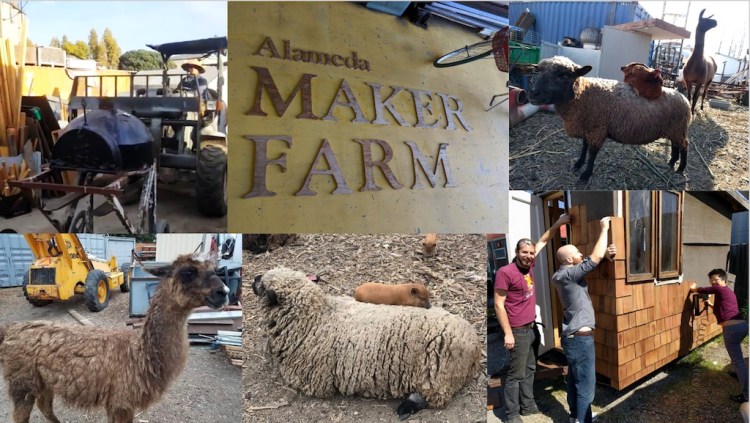The climate crisis is already here. Every year, the threat to vulnerable communities rises. In order to meet the moment, we must act quickly to protect those at risk. Recognizing the urgency to adapt, a group of skilled craftspeople have rapidly developed a new resilience space in the City of Alameda. At its current location, the Bay Area Maker Farm has only been around since the beginning of 2021. Since then, they have developed their allotted plot of land into a dynamic site. Their new location is on land owned by Alameda Point Collaborative (APC), the largest supportive housing community in Alameda County, which has provided them with the opportunity to support their residents, many of whom previously struggled with homelessness. This partnership has already proven fruitful, with many of the residents regularly showing up at volunteering events and workshops.
The Bay Area Maker Farm is in a unique situation, being the only resilience site in the City of Alameda. Although it is relatively new, the site will most likely act as a model for other potential hubs who are interested in building resilience in the face of climate change.
One area where they stand out is their incorporation of various makers, whose expertise and ingenuity contributed to the rapid establishment of the site in its current location. The members of the Maker Farm are skilled in a variety of crafts including woodworking, sewing, blacksmithing, and gardening. The site contains several shipping containers which have been converted into workspaces for the makers to rent out. Some of their projects include NorCal Resilience partner Wholly H2O, which promotes water conservation, and the Foodz Project, which turns food waste into hot meals for the homeless. During the pandemic, the makers have put their skills to good use, producing personal protective equipment and painting murals in support of Black Lives Matter during the height of the George Floyd protests.
Recognizing the lack of diversity in the maker community, the site has made efforts to promote equity by hosting community events for local BIPOC organizations as well as offering skill shares for their local community to bring new people into the maker’s space. These efforts are especially important given the fact that their area is 90% people of color while a majority of the makers are overwhelmingly white.
Although they have made remarkable progress since coming to their new location, the Bay Area Maker Farm acknowledges its need to further develop as a resilience hub, especially in the area of disaster preparedness. One area, in particular, they seek to flesh out is setting up clear procedures to respond to natural disasters such as extreme heat, smoke from wildfires, earthquakes, and flooding. Currently, the farm does not act as a food distribution hub despite its connection with the Foodz Program and the refrigerated truck on-site, but they are interested in setting up a food distribution program in the future. In terms of supplies, they do not have enough food, water, masks, air filters, first aid kits, or emergency go-bags to withstand a sizable disaster. There is currently no committee dedicated to disaster preparation, but there are ongoing efforts to rectify this shortcoming.
One area of strength for the Maker Farm is their connection with their community. The site itself is designed to be as open and inviting as possible. The gates are always open for visitors and anyone can come to their volunteer days. This has made them incredibly accessible to their APC neighbors and has brought in assistance from across the area including the local Coast Guard base. They also host regular meetings for groups such as BIPOC Alameda and have partnerships with Community Action for a Sustainable Alameda (CASA) as well as APC’s Farm2Market.
The farm also has made excellent progress to be more self-reliant with its water and energy practices. The entire site runs on renewable energy supplied by a solar panel owned by FEMA and operated by the makers. They are also looking to install backup batteries and generators to prepare for power shutoffs. Through Wholly H2O, the site is also working on adopting more water sustainable practices such as rainwater catchment.
The new Bay Area Maker Farm has quickly established itself as an innovative and dynamic resilience space that could serve as a model for the entire city of Alameda. Thanks to the creativity and ingenuity of the MakerFarm members, the site will continue to find innovative ways to better serve its community.
If you wish to learn more about the Maker’s Farm or assist in their projects, check out their website here: Bay Area Makerfarm
